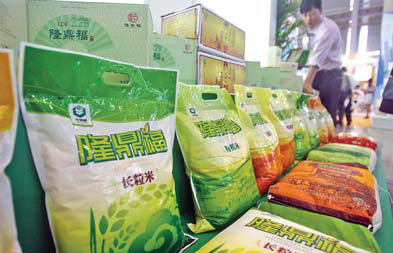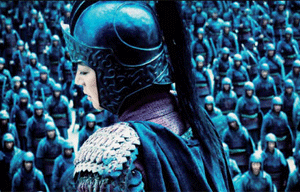COFCO seeks more overseas acquisitions
Updated: 2011-10-22 09:04
By William Bi (China Daily)
|
|||||||||
|
COFCO Ltd grain products on display at the 11th China International Exhibition for Grain and Oil Products, Equipment and Technology held in Ningbo, Zhejiang province. Zhang Peijian / for China Daily |
BEIJING - China National Cereals, Oils and Foodstuffs Corp Limited (COFCO), the country's largest trader of grains, said it is seeking overseas acquisitions. Any purchases would help to secure supplies of commodities including soybeans, wheat and sugar as rising domestic incomes spur faster food demand growth.
The State-owned COFCO is looking for investments in the United States, South America, Australia and Russia, said Frank Ning, the company chairman, in an interview in Beijing. He did not identify which companies were under consideration.
"I'm trying to connect the Chinese consumer market with outside sources," Ning said on Thursday. "Whatever the Chinese consume more of, need greater supplies of from outside, this is our area," he said. The company may become engaged in farming, logistics, processing, and trading ventures in supplier countries, he said.
Securing external food supplies is becoming increasingly important after urban household incomes in China more than tripled in the past decade, fueling consumption of meat, poultry and dairy products. China, which last year became a net importer of corn for the first time in more than 10 years, may have bought as much as 3.5 million metric tons in the first half, according to the researcher Grain.gov.cn on Oct 13.
China may have to increase imports because its dependence on the use of ground water for grain production "isn't going to be sustainable indefinitely", said Arthur Kroeber, managing director of Beijing-based GaveKal Dragonomics Research, a financial advisory firm.
Corn imports may surge to as much as 20 million tons annually by 2015, while rice imports may total 8 million tons, said Sunny Verghese, CEO of Olam International Ltd on Tuesday.
"Today China will have to look at global sources to balance its demand," Ning said. Corn has become particularly "tight" because of its wider application outside the livestock industry, such as paper-making and pharmaceutical use, he said.
China may be putting off "inevitable" large grain imports for 10 to 20 years to enable the opportunity to "develop companies like COFCO as domestic alternatives to Cargill (Inc) and give them some sense of security of supply", said Kroeber.
While the government has limited the expansion of corn-based industry to ensure a priority for livestock, "it's difficult to control demand for starch" and other corn-derived products because there's a strong demand for them, he said. So "either we produce here, or buy from outside", he said.
China has become more transparent in the past five years by disclosing grain reserves and by signaling that it wants to boost imports of corn and pork, Ning said.
Still, the world's biggest grower of grain will probably remain mostly self-sufficient in wheat and rice, Ning said. China's 1.3 billion people consume 160 million tons of rice annually, so no country can "fill the gap, if China produces a gap", he said. Thailand, the biggest exporter, only exports 8 million tons, said Ning.












